Which automaker isn’t going to make 600-mile EVs?
Is megawatt charging a threat to hydrogen fuel-cell tech?
This is our look back at the Week In Reverse—right here at Green Car Reports—for the week ending May 26, 2023.
The biggest EV news of the week came on Thursday, when Ford and Tesla made an announcement that might change the EV charging landscape forever: Ford is adopting Tesla’s charge port for future EVs, as well as providing Supercharger access with an adapter for existing EVs starting next year. Now, will other smaller automakers jump to the Tesla standard, too?
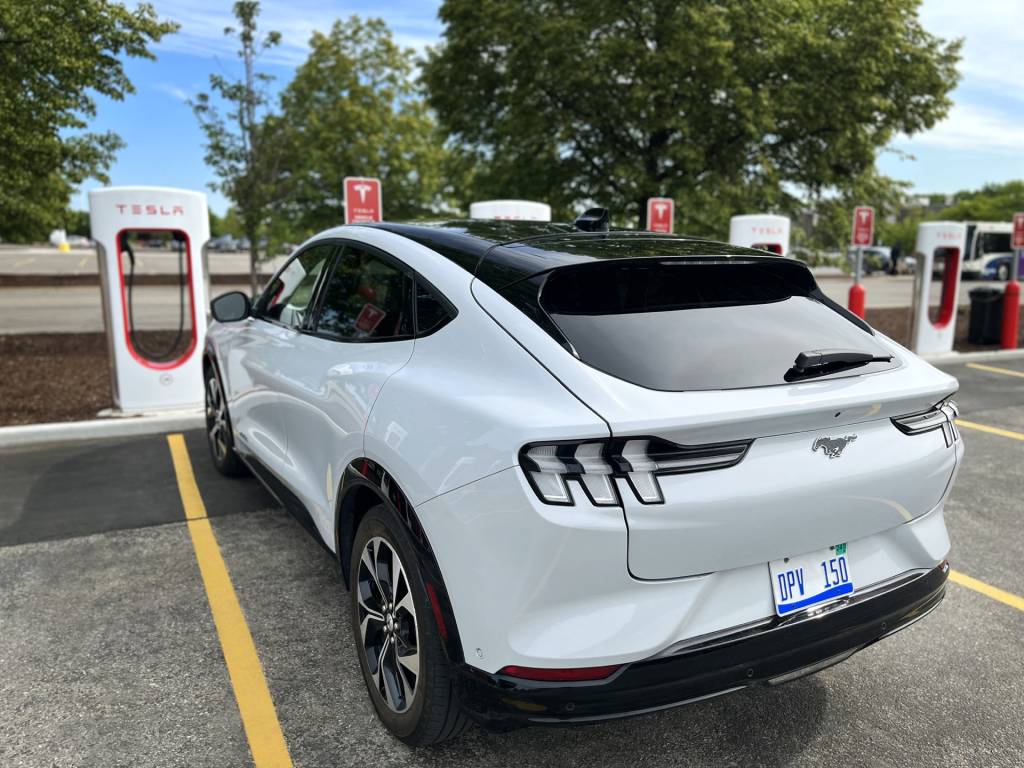
Ford Mustang Mach-E at Tesla Supercharger
That followed two pieces of Ford EV news from earlier in the week. Don’t bother waiting for an electric Ford Expedition Lightning to complement the F-150 Lightning. Ford claimed Monday that its three-row electric SUV coming in 2025 will be a groundbreaking “personal bullet train”—with a comprehensive focus on efficiency resulting in 350 miles of range from a 100-kwh battery pack and 150 miles from a 10-minute charge. And as Ford CEO Jim Farley explained, as part of its effort to control costs and build better EVs, the automaker is simply trying to use the smallest battery for competitive range. That means Ford isn’t going to go to 600 miles of range in its EVs.
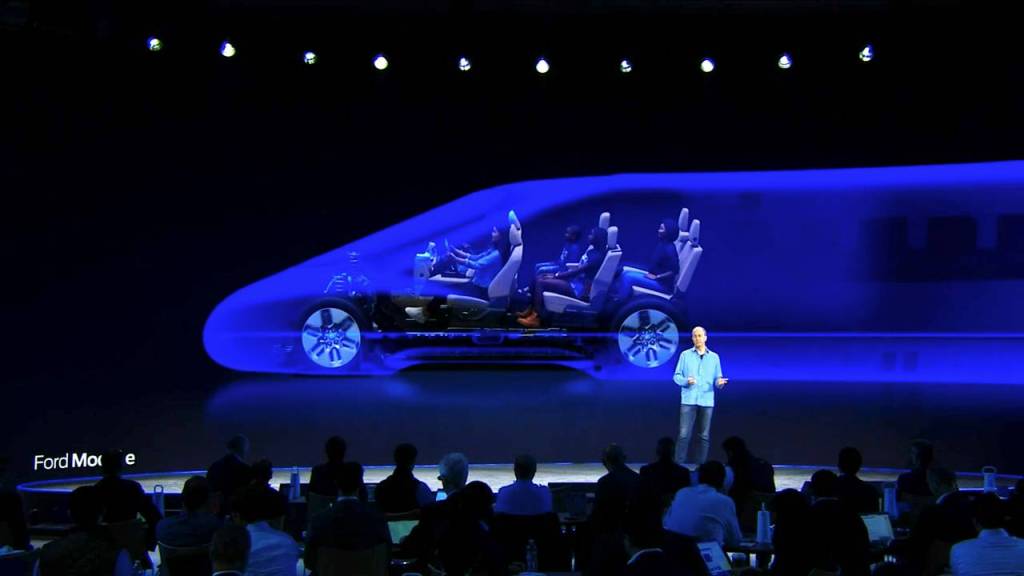
2025 Ford 3-row SUV –
On a completely different track, Cadillac announced plans to make a fully electric version of its big, thirsty Escalade SUV. The GM luxury brand claims the model, badged Escalade IQ and to be revealed later this year, will be “a different type of EV.”
The 2024 BMW i5 revealed Wednesday is essentially a fully electric BMW 5-Series. With a price starting at $67,795 and a driving range for that entry model of 295 miles on the EPA cycle, it claims to offer the same passenger space as other gasoline-fueled 5-Series models.
The upcoming EX30 will have Volvo’s lowest-ever carbon footprint in a production model from the brand, it says. The Volvo EX30 will represent a 25% drop in lifecycle carbon emissions versus the already-improved XC40 Recharge and C40 Recharge, it says, with lots of recycled materials and “100% climate-neutral electricity.”
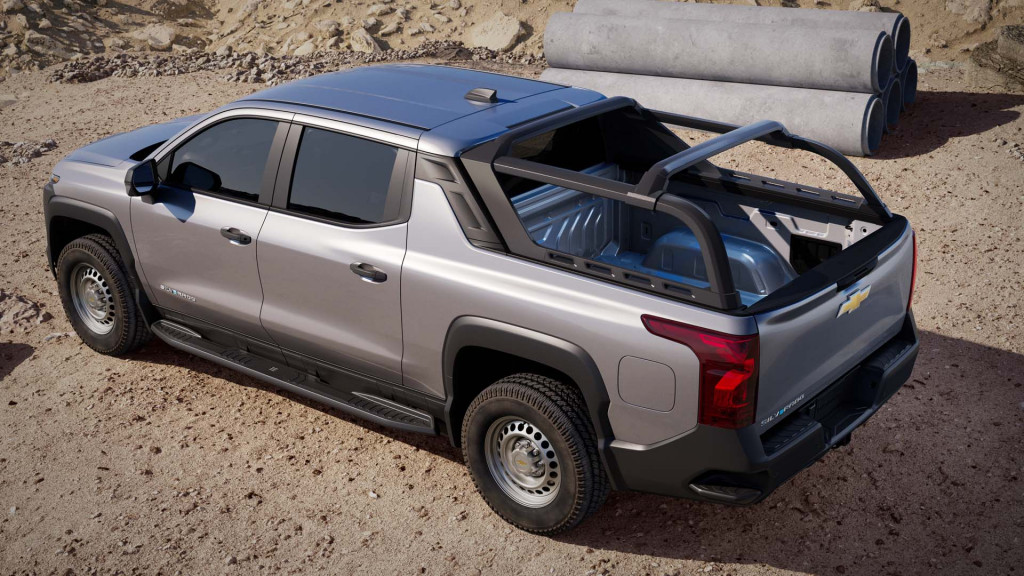
2024 Chevrolet Silverado EV
More information about the 2024 Chevrolet Silverado EV Work Truck (WT) trickled out ahead of deliveries set to start soon. Among the new details: The WT and its base battery will be available to retail customers, but not other WT versions. Knowing this, we took a look at the Silverado EV WT vs. the F-150 Lightning Pro in price and range.
As it oversees the rollout of a $7.5 billion nationwide network of EV chargers, the federal government is tackling EV charger reliability in the U.S. That means collaborating with companies on hardware and software, and opening up a data portal for reporting uptime and error codes.
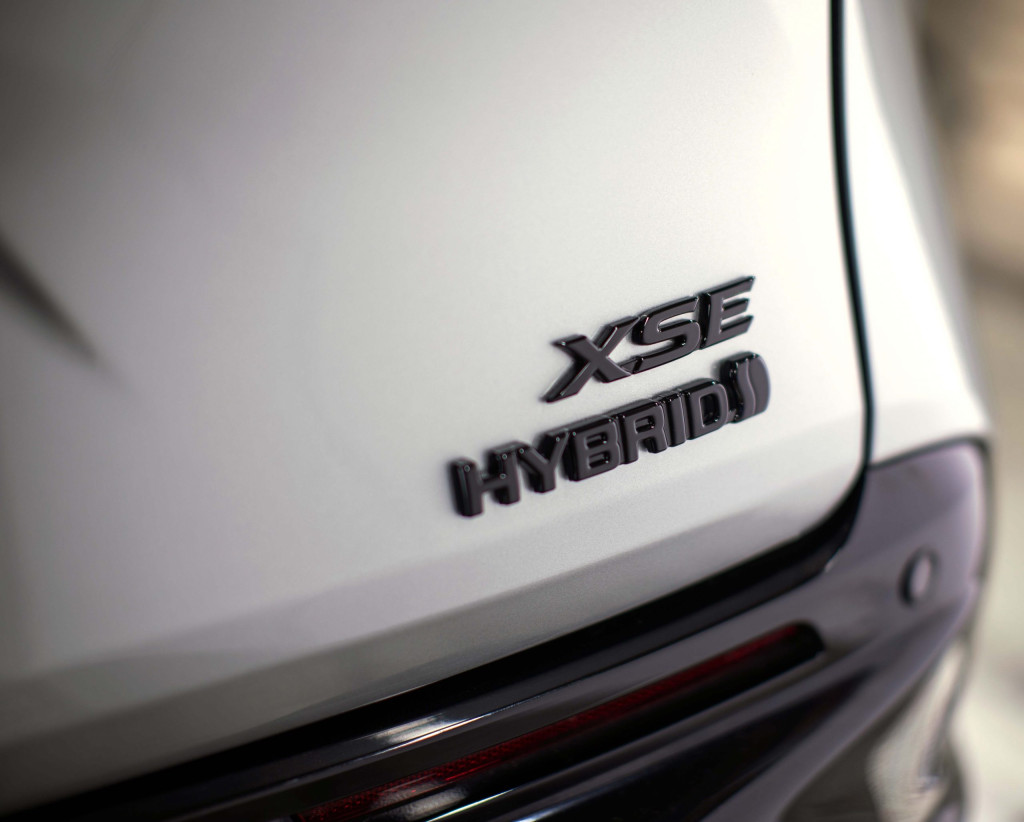
2023 Toyota Sienna
Toyota announced last week that it plans to boost its U.S. hybrid production to meet what it says is strong demand for hybrid models. The same manufacturing complex in Kentucky is scheduled to start making fuel-cell modules this year.
BMW and California’s Pacific Gas & Electric (PG&E) have built on a previous smart-charging partnership with a pilot program (and later, a field trial) looking at how EVs could supplement home energy and the grid. With a BMW i4 it can help return double the amount a typical house uses daily back to the grid—at the peak times when it might help boost the use of renewable energy.
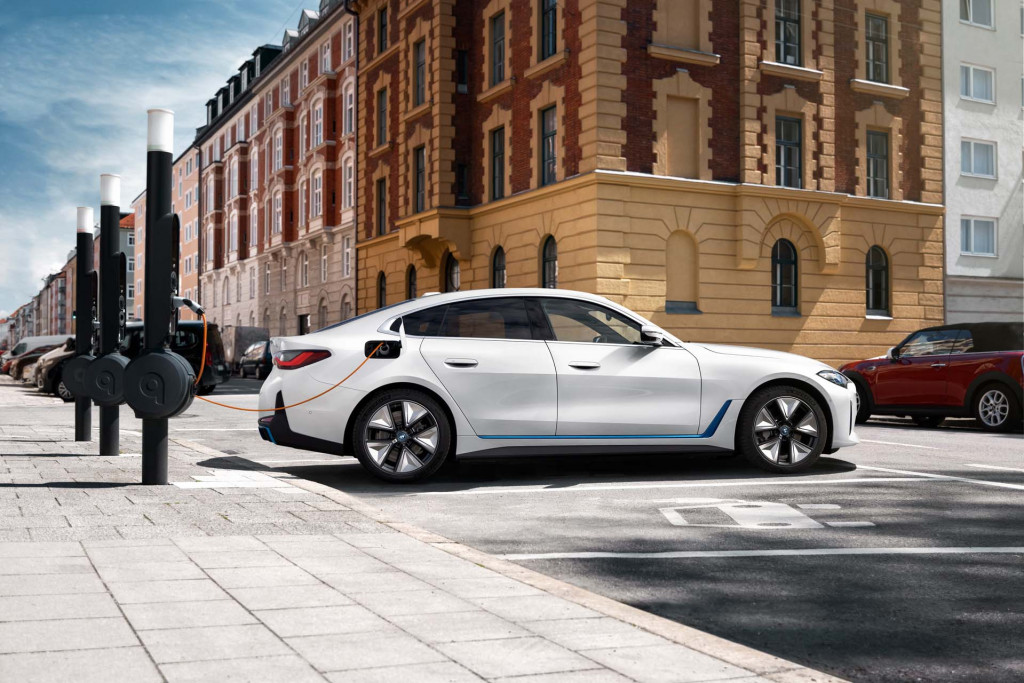
2022 BMW i4 eDrive40
While enthusiasm for hydrogen fuel-cell passenger vehicles has waned, it appears poised for a new push in semis and other heavy-duty trucks. Will megawatt charging effectively nix hydrogen and its top advantage which up until now has been refueling time?
Hyundai Ioniq 5 and Ioniq 6 lease prices now undercut those from Tesla, according to a report digging into the numbers. Once again, the assist goes to the Commercial Clean Vehicle Credit loophole applying to EV leases—even if they’re imported.
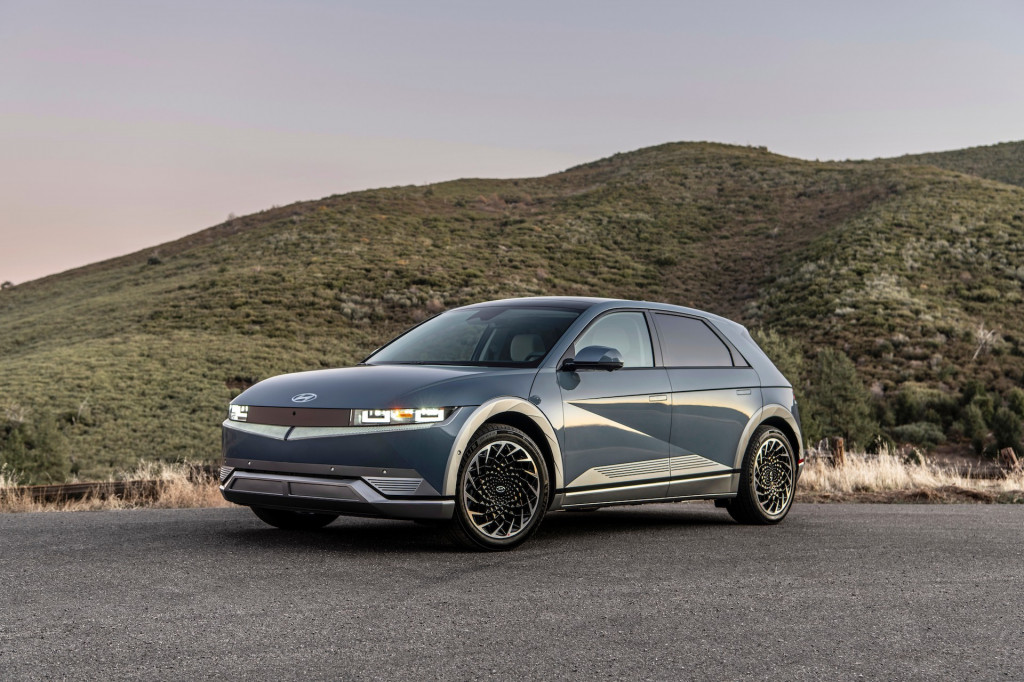
2023 Hyundai Ioniq 5
Looking directly to that, Hyundai and LG this morning confirmed final details for a joint-venture battery plant in Georgia that will supply Hyundai’s Georgia EV Metaplant with U.S.-built batteries. That plant will have the capability to build 300,000 EVs annually, though the company hasn’t yet confirmed which Hyundai, Kia, or Genesis models those will be.
Future Stellantis EVs later in the decade—from Jeep, Ram, or Chrysler, for instance—may take advantage of potentially range-boosting, weight-cutting lithium-sulfur battery tech. Through Stellantis Ventures, it’s invested in California’s Lyten, which claims “a pathway to achieve the lowest emissions EV battery on the global market,” in a cell type that can be made globally. But there’s still progress to be made on cycle life and degradation.
Electric vehicles cost 47% more than internal combustion vehicles, yet they’re driven 29% less. That’s one finding from a recent data crunch based on used vehicles listed for sale—and it confirms previous findings from academia suggesting that Tesla leads other EVs in miles driven. But perhaps policy needs to focus more on those “gasoline superusers.”
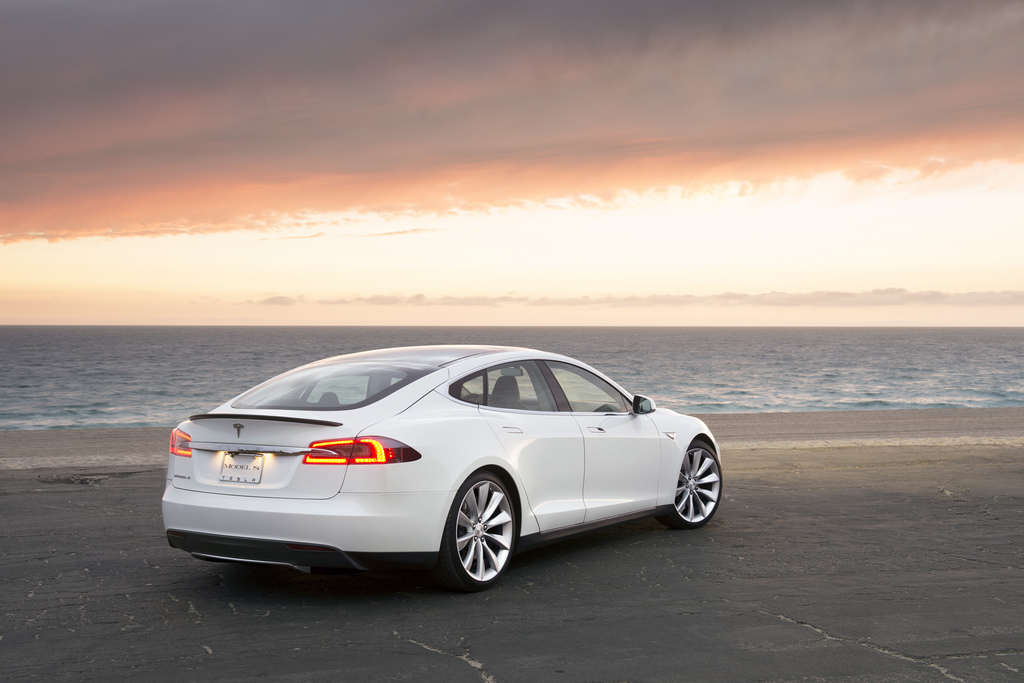
Tesla Model S
Despite all the talk about EV battery longevity, and how their drivers aren’t covering as many miles, EVs aren’t staying in the fleet as long as gasoline models, and as we seek more EV adoption it’s a potential problem. What’s to blame?
And what is all the fuss over AM radio in EVs? Some automakers say it’s electrical interference; some say nobody’s listening to AM anyway; others point to the lack of AM radio in Europe. Either way, Ford yesterday decided it wasn’t a fight worth fighting and agreed to bring back AM radio in its EVs.
_______________________________________

